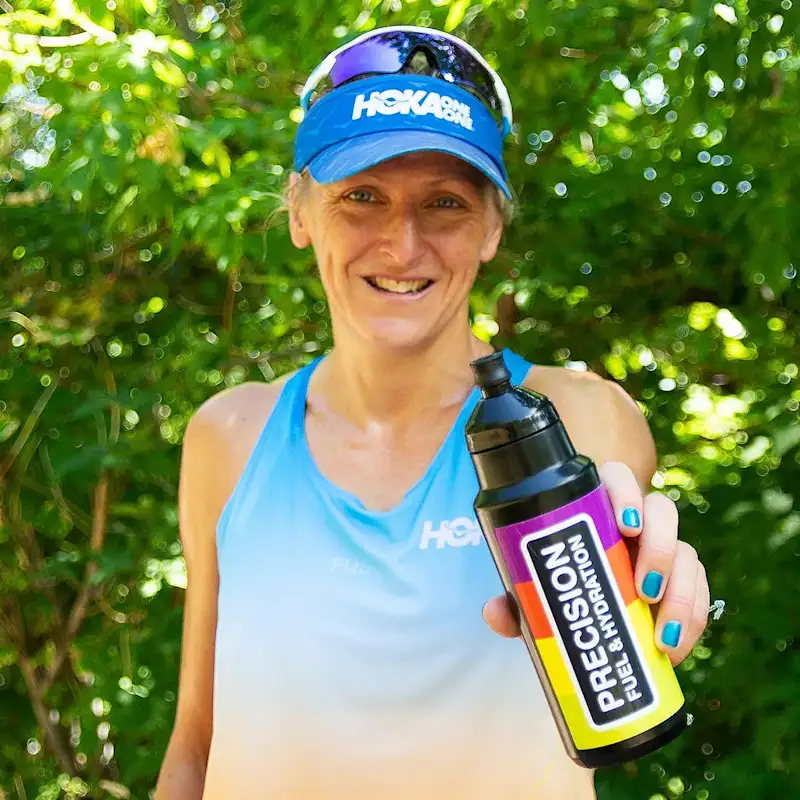
Laura Siddall
Challenge Roth
Laura's headline numbers
Laura's strategy
Fueling
Carbohydrate is the main fuel you burn when racing. Failing to fuel properly is a leading cause of underperformance in longer races.
During the race, Laura's carb intake was slightly below the recommended 90g/h, but this was still a step up from her intake at her last race; at IRONMAN Lanzarote, Laura consumed ~69g/h on the bike and ~65g/h on the run compared to ~86g/h and ~73g/h this time out. As she reported her GI comfort 10 (out of 10), this shows great progression in her gut tolerance and we’d recommend she continues this trend and gut training to allow her to take on board even more carbohydrate and hit the recommended levels.
Hydration
Taking on board an appropriate amount of fluid and sodium is essential to maintaining blood volume and supporting the cardiovascular effort needed to perform on race day.
Whilst the absolute amount of sodium and fluid consumed per hour is important, it’s critical to consider these in relation to each other. This is known as 'relative sodium concentration' and it’s expressed in milligrams per litre (mg/L). How much sodium you’re taking in per litre of fluid is more important than the absolute amount taken in per hour.
Sweat sodium concentration (mg/L) is largely genetically determined and remains relatively stable. Knowing how salty your sweat is enables you to replace a good proportion of your sweat losses, which can range from 200-2,000mg/L.
Whilst Laura’s losses are on the low side, getting her hydration strategy right is still crucial when it’s hot and/or humid as her higher sweat rate in these conditions can result in significant net losses over the duration of a race.
Learn moreLaura used a combination of diluted PH 1500 and PH 500 tablets, and drank a high volume of additional plain water which meant she took on a relative sodium concentration much lower than she has previously and than her sweat losses. This continued on the run, only taking plain water from aid stations before she went on to experience some cramping. In an attempt to avoid this in future races, she should look to increase her sodium intake by mixing each tablet with 500ml of water, and using some Electrolyte Capsules to increase her relative sodium concentration. Reflecting the warm temperatures later in the race, Laura’s fluid intake and she reported feeling thirsty on the run leg. Despite feeling like she had not drunk enough, she peed a few times on the run. This could have been a result of primarily taking on plain water, where a higher sodium intake alongside this would’ve helped with fluid retention.
Caffeine
Beyond the Three Levers of Performance (carb, sodium and fluid), caffeine is one of only a few substances that is proven to improve performance for most endurance athletes as it can help stave off mental and physical fatigue.
Laura habitually uses caffeine during her races and usually consumes a dose much higher than the recommended 3-6mg/kg. We have worked with Laura to dial back on her caffeine intake after she reported sleeping poorly following major races and this race demonstrated an improvement in this area. Still, her intake is above the recommendations, so it’ll be useful for her to monitor her sleep patterns after and see if this helped or if she needs to further dial it back.
How Laura hit her numbers
Here's everything that Laura ate and drank on the day...
Laura's weapons of choice
Final thoughts
Laura's full stats
Data Confidence?
There is an adequate level of accuracy in the data collected and the numbers reported. The athlete manages to recall what they ate and drank including most specifics (brands flavours quantities plausible estimations of volumes). However there are estimations made within the data which affect the overall confidence level in the data reported.